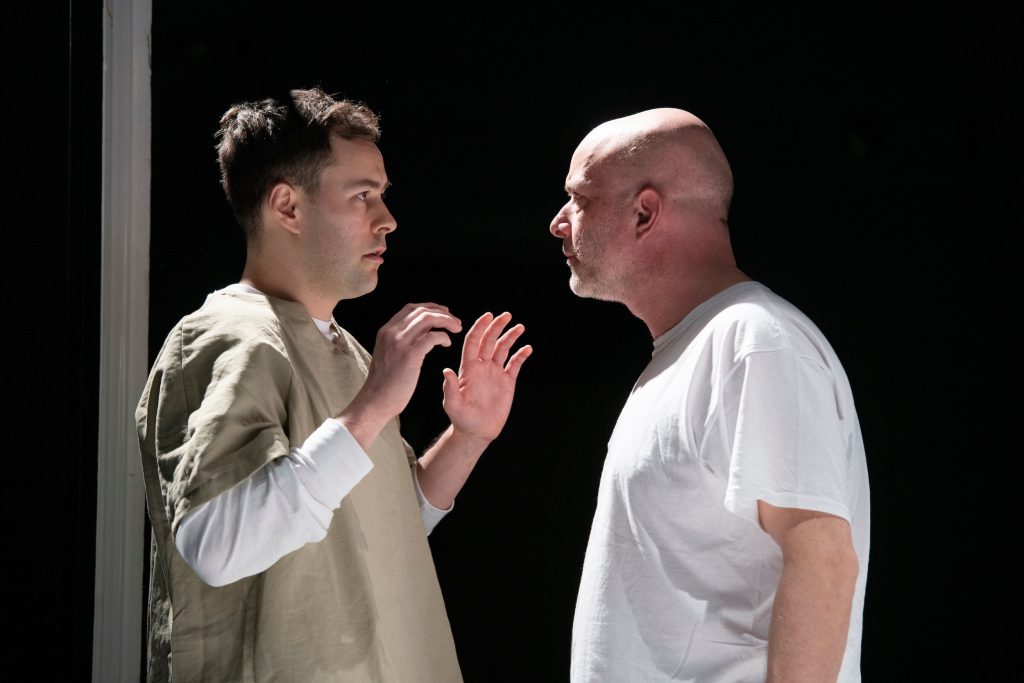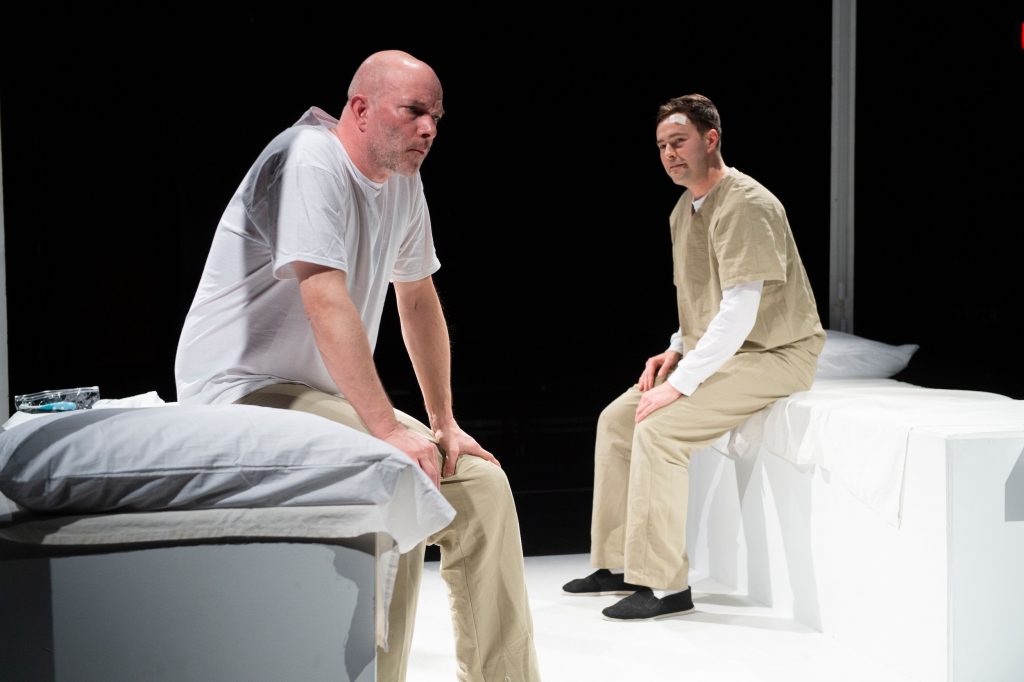
Credit: David Cooper
At Studio B (Gateway Theatre) until March 23, 2019
Tickets $29 at tickets.gatewaytheatre.com or 604-270-1812
Posted March 19, 2019
In a word: harrowing. Playwright Meghan Gardiner tackles sexual assault within the prison system in this uninterrupted hundred-minute scorcher. We all know that sexual predation between guards and prisoners, as well as between prisoners, happens; all too frequently it ends in suicide.
Studio B is the perfect venue for Gross Misconduct: it’s small, it’s intimate and it’s in your face. Directing for SpeakEasy Theatre, Kayvon Khoshkam sets the action on the floor and in the round, which is always interesting as the audience not only sees the play but sees the reaction written on the faces of those seated opposite. Set designer Markian Tarasiuk keeps it surgically stark and simple: white floor, four upright posts suggesting the cell perimeter and two white-draped ‘beds’. When Gareth (Scott Bellis), the prison guard, slides two tin-foil plates into the 3m x 3m space, we imagine the bars of the cell. Jillian White’s lighting is dazzlingly bright inside the imagined cell and shadowy around the perimeter where one character circles.

Credit: David Cooper
The setting is Millhaven Institution, a maximum-security prison in Bath, Ontario, housing 500 inmates. It seems strange that Deke (Ian Butcher) has had a cell to himself for years but when Gareth puts cocky young Corey (Mike Gill) in the cell with Deke, it soon becomes obvious why Deke has been housed alone for so long: he has a history of violence.
The title comes from hockey and despite their differences Deke and Corey meet on that ground: favourite players, favourite teams, recollection of games. Gardiner plays with the double entendre: gross misconduct both on and off the ice. In one of the most touching scenes – performed in the dark after lights out – Deke calms Corey down with hockey talk after the young man has been brutally sodomized.
Gross Misconduct is an unravelling mystery and it relies on several coincidences that strain at credibility but the staging and performances are so excellent that it’s easy to cut the playwright some slack. It’s one of those plays that mystifies along the way – who did what to whom and when – but ties it up at the end.

Credit: David Cooper
Scott Bellis is Gareth, a gum-chewing, nice-on-the-out-side-evil-on-the-inside prison guard. Bellis completely captures Gareth’s hair trigger as the character switches from cheerily greeting the guys in the morning with their breakfast then dragging Corey out of the cell for whatever awaits him at the hands of other guards, other prisoners. Bellis is so snaky in the role, it makes your skin crawl.
Ian Butcher’s Deke is powerful, secretive and a potential threat to Corey whose presence in the cell Deke hates. Butcher’s physicality dominates the stage and the audience’s awareness of potential threat is palpable. But buried deep inside this character is the young man Deke used to be and as Gross Misconduct progresses, Butcher reveals that sensitivity.
Sereana Malani is Abby whom we first meet when she’s fifteen and has a crush on a frat boy. In dim light, Malani circles the cell – at first full of girlish enthusiasm: her first beer, her first party and the first time the boy she refers to as “my crush” pays attention to her. Putting two and two together, we know her story does not have a good ending. But for a long time, we are not able to put the stories of Deke, Corey, Abby and Gareth together.

Credit: David Cooper
Gardiner keeps us guessing about Corey – although Mike Gill makes it pretty obvious he’s an offspring of wealthy parents, feels entitled and fully rejects the sexual assault charge against him. But we also know he is being regularly brutalized when he comes creeping back to the cell with blood-stained cotton trousers.
This is not a pretty play and it’s not easy watching. But with the #MeToo movement slowly moving to the back burner, it rekindles all the arguments. Gardiner provides an explosive ending that resonates long after the lights come up. Prepare for whiplash.

